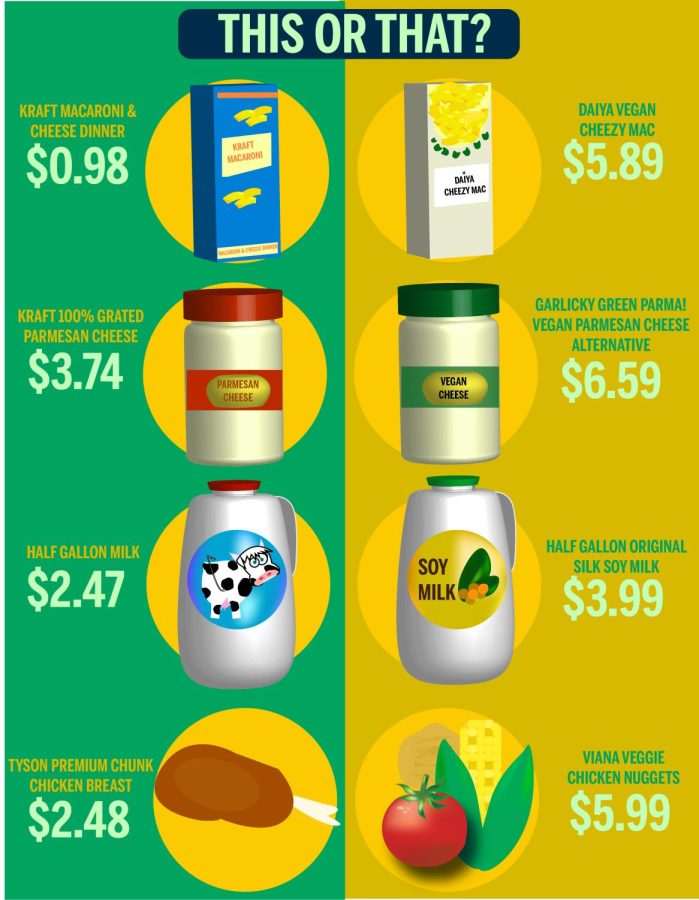The price of going vegan
April 24, 2017
Since switching to a vegan lifestyle in March 2016, Kylie Orrenmaa has seen a positive impact in her life. She said she feels healthier, stronger and has more energy.
“I care about animal rights and how the food I eat is processed and treated,” Orrenmaa, a sophomore pre-nursing major, said.
A vegan lifestyle consists of excluding meat and other animal products from a person’s diet and life. Instead, vegans rely on plant-based foods such as fruits, vegetables and grains.
Plant-based foods are filled with fiber, water, healthy fats, proteins and energizing properties that stabilize your digestive system and blood sugar levels, according to One Green Planet.
Since going vegan, Orrenmaa said she didn’t think it would impact the way she spends money at the grocery store, but her spending decreased.
Orrenmaa said she often finds herself shopping at Earthfare and Wholefoods to find vegan treats for her and her boyfriend, spending around $100 a week on organic and vegan groceries for the two of them.
Along with Orrenmaa, freshman theatre studies major Talia Rockland saw a decrease in her grocery shopping bill since starting a plant-based diet.
She said she mainly eats salads, oatmeal, toast, peanut butter, fruits, vegetables and grains throughout the day.
In 2016, the average person ate 214.6 pounds of red meat and poultry, according to the National Chicken Council. By cutting meat out of one’s diet, it can make a significant impact on the money spent each year on food.
“The meat and cheese substitutes can be nearly three-times more than a regular meat or dairy product,” Orrenmaa said. “On-campus is almost always more expensive too than off-campus.”
To help maintain a healthy diet and lifestyle, student vegans can get protein from lentils, tofu, black beans, quinoa, artichokes, oatmeal and more.
“As with any lifestyle, choosing a balanced plate with food from each group is always the most important thing you can do to maintain a healthy lifestyle,” said Megan Brzuski, a Kent State nutritionist with Dining Services. “Whether eating organic, vegan or both, being sure to fill your plate with protein, fruits, vegetables and whole grain for every meal is the best solution.”
Eating solely organic foods can be a challenge on the college students’ budget as well. Students shopping on or off campus can find that the healthier, cleaner options may be bulked up in price.
“I’ll go to the store and the organic milk or organic blueberries will be a couple dollars more than the regular ones,” Orrenmaa said. “It is worth it to buy organic, though — you’re avoiding added GMOs, chemicals and hormones.”
Students who are willing to spend a couple extra dollars on the “dirty dozen” can avoid high contents of pesticides. The “dirty dozen” includes peaches, apples, sweet bell peppers, celery, nectarines, strawberries, cherries, pears, grapes, spinach, lettuce and potatoes.
“If you can’t afford to eat all organic, just buying the ‘dirty dozen’ organically can reduce your toxin intake by 80 percent,” Stella Speigel, a holistic nutritionist said.
While buying vegan options on a budget off campus varies, on-campus vegetarian, vegan and organic options may be more accessible to students. For Kent State students, the university is one of the top 10 most vegan-friendly colleges in the United States, according to People for the Ethical Treatment of Animals (PETA).
“We offer a wide variety of food options to help with any students’ dietary needs,” said Richard Roldan, director of dining services. “Gluten free, vegan, vegetarian, local and organic options are labeled throughout all dining halls across campus.”
Becca Martin, a junior theatre studies major, buys a lot of her vegan meals on campus with her meal plan.
“There’s at least one vegan option at any dining hall I go to,” Martin said. “Prentice has the most variety of vegan options for students.”
Prentice Café recently became the first Gluten Intolerance Group (GIG) certified full dining hall on a college campus in the nation. Students with a gluten-intolerance can make sure their allergy is unprovoked, while also offering a wide array of vegan and vegetarian options.
To top it off, students are able to take advantage of Veggie A-Go-Go, an affordable, on-campus vegan and vegetarian program that provides meatless food with a call-ahead order. Students can call either Eastway or Prentice Café to order a vegatable-based or vegan meal on-the-go.
“This is such a great food program for all meatless eaters,” said Brian Downs, a senior disability studies and inclusive communities major. “I use it all the time to get great veggie pastas and pizzas. My girlfriend is a vegan and loves it as well.”
To stay on budget while buying vegan or organic options, students can look to shop at local farmer’s markets to ensure quality and price.
“Buying fruits and veggies from a local farmer’s market is your cheapest, healthiest option,” Speigel said. “They contain no contaminating pesticides or GMOs, which are bad for your health and the environment.”
Furthermore, students looking to save money on vegetarian, plant-based or vegan options should buy ingredients and cook a meal at home to save some cash.
“Restaurants with vegan options may charge double the price of the same dish made with regular meat,” Brzuski said. “Students can save a lot of money by cooking a meal themselves at home and avoiding the commercialized food fad.”
Before scrambling to the nearest store and bulking up on substitute cheese, meat or different varieties of vegetables, find out where healthy, organic meat-free food options there are that won’t break your bank.
“People have this stereotype of vegans that we’re limiting ourselves,” Rockland said. “It’s a fairly easy lifestyle, especially at Kent. It’s what you make of it.”
Mikala Lugen is the student finance reporter, contact her at [email protected]

























